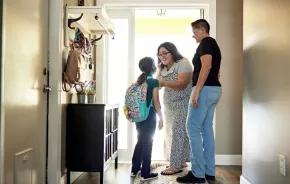 It happens, even to the best of us: A child pushes the wrong button at exactly the wrong time, and … we snap! Usually, snaps take the form of a sharp tone, a raised voice or even a rougher-than-usual grab. These moments can be terrifying — for children and parents alike — leaving a harried and regretful mom or dad scrambling to make amends, even while dealing with horrible guilt.
It happens, even to the best of us: A child pushes the wrong button at exactly the wrong time, and … we snap! Usually, snaps take the form of a sharp tone, a raised voice or even a rougher-than-usual grab. These moments can be terrifying — for children and parents alike — leaving a harried and regretful mom or dad scrambling to make amends, even while dealing with horrible guilt.
We’re talking about the typical “losing it” moments of otherwise careful and caring parents; major snaps — the kind that results in the serious harm of mental or physical abuse — are different animals and won’t be addressed here. But those garden-variety snaps? They can be prevented, and when they’re not, there are ways of effectively repairing the damage.
Recognizing our limits
Self-awareness is the key to preventing snaps, says Kathy Melman, Ph.D., clinical psychologist at the Department of Psychiatry and Behavioral Medicine at Seattle Children’s. We all have different limits, Melman says, and learning to recognize our personal hot buttons is the first step toward preventing a meltdown.
To increase awareness, Melman suggests parents keep a journal describing the types of situations that make them lose control. What was happening? Where were they at the time? How did they react? Once parents have a better understanding of their weaknesses, they can work to prevent situations from escalating as they struggle to maintain control. A journal may also help parents notice times of day or situations in which they’re particularly vulnerable — morning rush, dinnertime, public places. Parents may also notice a pattern of kids pushing personal hot buttons; after all, they’re experts: They’ve been observing their parents since birth!
Picking up the pieces
Exhausted Edmonds mom Sylvia* just wanted a nap. Her 2-year-old daughter, Lily, thought otherwise. Sylvia put the toddler to bed, promising a trip to Gymboree if she napped. But Lily cried and cried, protesting the nap. After trying to calm her down a few times, Sylvia gave up, hoping Lily would “cry it out.” After two total hours of nap refusal, frustrated Sylvia snatched her daughter from her crib, slapped the pacifier out of her mouth, and yelled, “Fine! Don’t take a nap!” Frightened, Lily stood and cried, avoiding her mother for 15 minutes before Sylvia, racked with guilt, could calm down enough to hold her daughter and apologize. When Lily calmed down, Sylvia felt so guilty that she gave in and took her daughter to Gymboree to make up for her snap.
How should Sylvia have picked up the pieces? According to Melman, the best way to smooth things over with a child is to sit with her once everyone has calmed down and talk about what happened. Say something like, “I got really angry, and it was wrong of me to hurt you. I want to love you the best I can and I made a mistake. I’m sorry I hurt you. I’m sorry I scared you.” And it’s important that parents stick to the consequences that were already set. Sylvia could have said, “I did say that we could only go to Gymboree if you took a nap, so we won’t be going today.”
Making changes
When it comes to snaps, prevention is priceless. At HopeSparks, a nonprofit family support agency in Tacoma, parenting classes emphasize self-care as the keystone of good parenting. “When we’re frustrated, it’s harder to give nurture to our kids,” says Joe LeRoy, M.S.W., program director of counseling services. HopeSparks sees many families in crisis — divorces, financial problems, state referrals — but despite those stressors, LeRoy urges parents to build self-care into their lives. “Parents’ health is crucial to the family system. They’re such an important piece in their child’s life,” he says. Self-care can be as simple as taking a bath, reading a book or calling a friend.
But what do we do when we’re pushing a cart with a child who’s screaming, “I want that! I WANT THAT!” When we’re stressed enough for our baser survival instinct to kick in, “our IQ plummets 20-60 points,” says LeRoy. Try to remember in that moment that you are working with reduced resources, and rely on a few techniques. Take time out, remove yourself from the situation, take your child out of the situation, and seek calm and safety. Even without abandoning your cart full of stuff, you could move to the book section, pet section or garden department, whatever calms you, stand a few steps away from the cart, browse and breathe until you’ve calmed down. When survival mode subsides, you can respond to the situation appropriately. If you can consistently find calm amidst the storm, you can effectively prevent — or at least reduce — parental snaps and their effects. We should all expect to slip from time to time, but that’s OK, experts say. We’re all human, and it’s OK for our kids to know that.
*Not her real name.
Maria Bellos Fisher is a freelance writer and family relationships blogger in Mountlake Terrace. Her blog, Hereditary Insanity, details her snaps.











